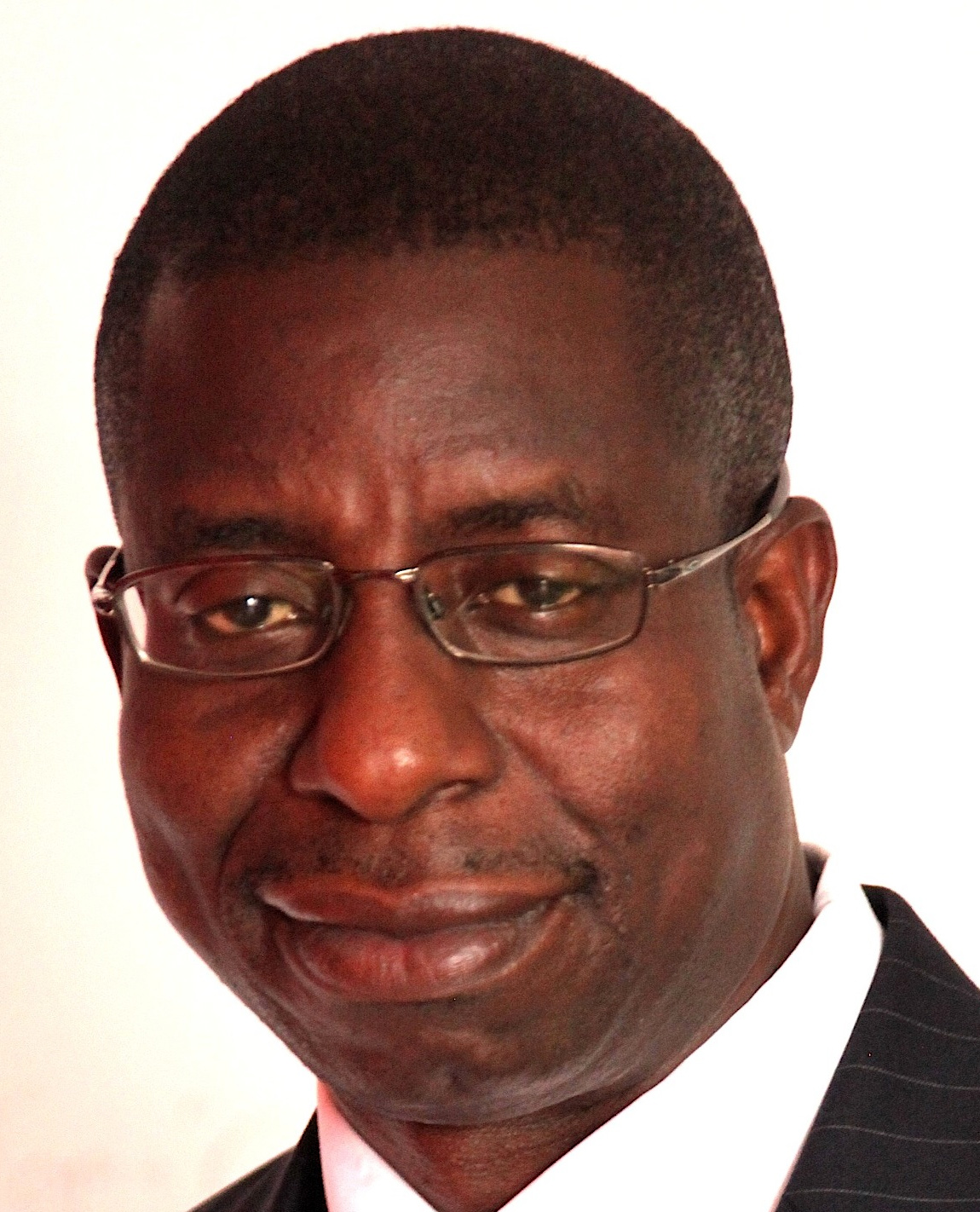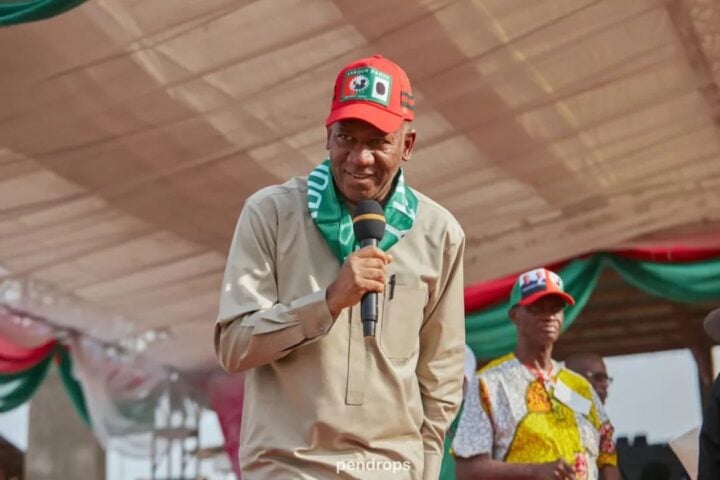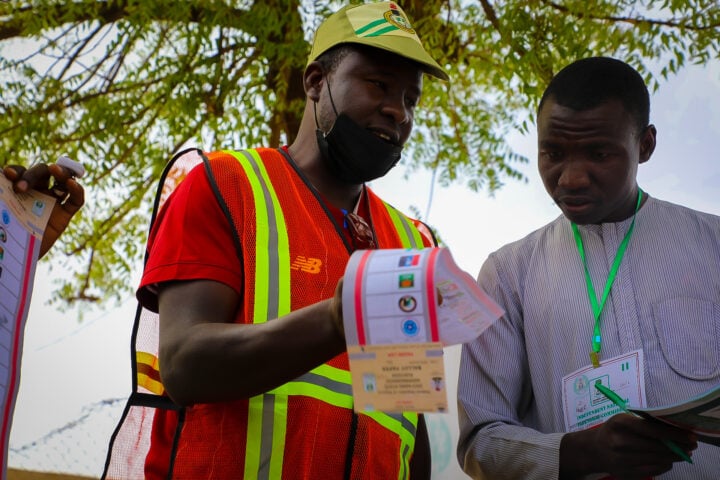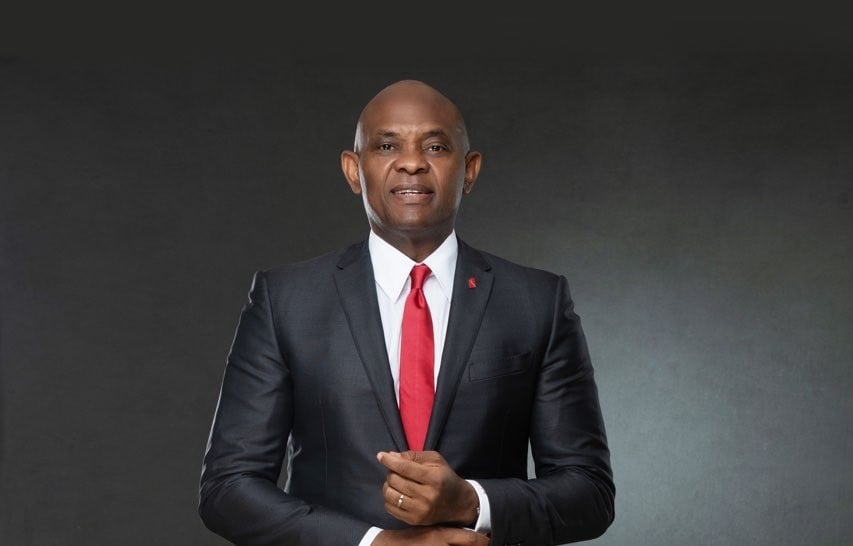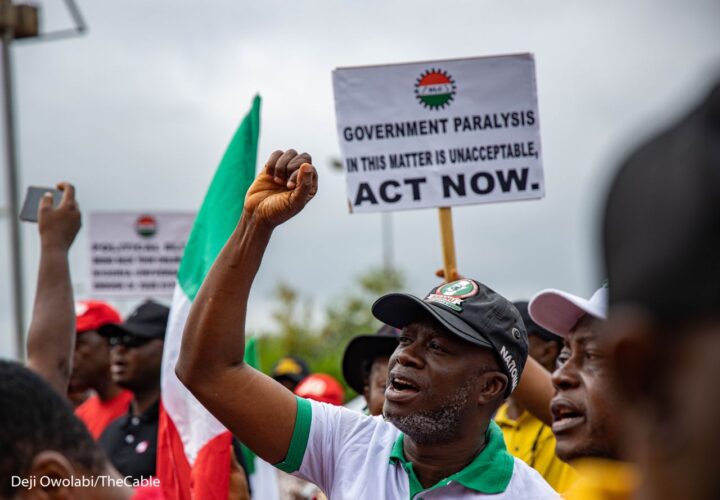It has to be hoped that in one sober moment, after his cringeworthy performance on Channels Television propounding what may be called the theory of non-interpretation of the constitution, Mr Yusuf Datti Baba-Ahmed would recoil from his own performance. That he would be embarrassed by the realisation that the species of argument he displayed in his effort to persuade President Muhammadu Buhari not to handover to President-elect Bola Ahmed Tinubu on the 29th of May, and to dissuade the learned justices of the Supreme Court from interpreting the constitution at his and his principal’s Labour Party suit, fall well below what may be expected of a first-year student of rhetoric.
Maybe not a first-year student of Baze University, founded by him, if the sort of intellectual reasoning he so fatuously exhibited is the driving spirit of academic pursuits thereat. One of the factors that endeared the Peter Obi/Baba-Ahmed ticket to a section of our educated compatriots, especially the youths — despite the carpet-bagger and piratical manner of their overnight ditching of the Peoples Democratic Party where their heart and soul belong to snatch the presidential ticket of the Labour Party without any previous connection to workers and progressive causes — is that they seemed to be intellectually curious and Datti-Ahmed, founder of a university, was the deeper thinker of the duo. Considering that he sought to replace the erudite Professor Yemi Osinbajo, a law don, one wonders what the out-going vice president thinks of his would-be successor’s astonishing claim, made without any iota of doubt, as if relating dogma, that Section 134 of the Constitution comes “already interpreted” in support of a view that must surely produce the very sort of absurdity that no parliament nor court of law would countenance.
I watched with utter disbelief as Baba-Ahmed spoke in apocalyptic terms on national television, claiming that if Tinubu, elected by the majority of the votes across the country, were to be sworn-in as president, that would be “as good as swearing-in the Nigerian Army” and that “this democracy is going to end on the 29th of May, 2023.” The reason for this unfounded claim? That it would amount to swearing-in “people that have not satisfied the requirement” (to be president and vice-president). I was not alone in my disbelief. His interviewer, Seun Okinbalonye of Channels Television’s Politics Today, could barely conceal his surprise and sought to nudge him unto the path of sobriety. In vain as Baba-Ahmed, spewing those sure signs of intellectual bravado — “please write it,” “quote me on it,” “I’m very happy to say it,” “you know my name,” “don’t stop me,” “I know what I’m saying” — went on with his puffery. No, sir, with due respect, you don’t know what you are saying! His interviewer did manage to get him to admit that he was only propounding his own interpretation, but not to make him self-aware enough to refrain from insisting that “however extreme” his view might be, he is happy “saying it on national TV,” and that it is “the correct interpretation.” By his own authority, then, only Baba-Ahmed’s interpretation is the correct one and no other citizen may hold a contrary view. The irony is that he is in court at all even when issuing this warning: “CJN, your Lordship, do not partake in unconstitutionality.”
A judge, and the chief justice of Nigeria no less, interpreting the fundamental law of the country, can by any means be held to be carrying out an unconstitutional act? Apparently, according to Baba-Ahmed, as he dug himself deeper in the fallacious hole by issuing another diktat: “the constitution says each of, that is 24, after that ‘and,’ and you come and tell me that go and get an interpretation? This is an interpreted document. Constitution of the Federal Republic of Nigeria is an interpreted document.” He then invited us to “get academic” and presented the only scenario when learned justices can be allowed to interpret the already interpreted constitution: if a candidate wins one hundred percent of the states and the opponent challenges the result by claiming that the constitution prescribes two-thirds of the states, only then “their Lordships can say no, we hereby interpret it to mean this”! No need to bore you further with this specious intellectualism but he fares no better with matters of fact. Baba-Ahmed claims that the election was rigged, though his Labour Party’s six million-plus votes were not rigged. So confused, or may be just insincere, while affecting the false air of a calm and objective intellectual, he was in that interview that he tied himself up in knots, claiming both to have faith in the courts and to have no faith in the courts, admitting that the election held (because his party’s votes were lawful and not rigged) yet that “the election did not hold”! He sought to explain away his damning inconsistency on the ground that “election is made up of four things: the voting of lawful citizens exercising their civic responsibilities . . . transmission of the results according to the guidelines and the electoral act, then collation according to the electoral act itself, and then declaration according to the constitution.” Who knew!
Advertisement
Baba-Ahmed’s incoherence, his illogicality, alone make it ordinarily unnecessary to join issues with him. Regrettably, however, the power of incendiary propaganda such as his is not in their merit or truth value but in their appeal to the raw emotions of those who, having lost an election, cannot bring themselves to accept the crushing pain of defeat. And would cling to any claim, however false or even incredulous, to nurture their grief and trauma as having been caused by the great injustice done to them, in this case rigging (which does not apply to their victories). We have seen what lethal danger this attitude of never accepting defeat and then delegitimising the electoral body and the courts (except when the results favour them) poses to democracy in Donald Trump’s America. Without a shred of evidence and with over sixty cases he filed to challenge President Biden’s election dismissed by the courts, Trump still stirred up a mob to invade the Capitol, the US parliament, in a bid to stop the inauguration of the duly elected candidate. Baba-Ahmed’s clever likening of Tinubu’s swearing-in to bringing back the Nigeria Army to power is a barely disguised call for a coup if he and Peter Obi are not declared the winner of the 25th February election and installed instead of Tinubu-Shettima. And the tenuous ground for this rascality is the self-important notion of “taking a risk” to save Nigeria in the face of the impending violation of the constitution after the electoral law and all other laws and promises have been violated (again, not with respect to the votes that his party won).
Yet, the only person showing utter disregard, indeed, contempt, for democracy is Baba-Ahmed himself, staking everything on the three-letter word “and” in Section 134(1) and (2) of the constitution: “A candidate for an election to the office of President shall be deemed to have been duly elected, where, . . . (a) he has the majority of votes cast at the election; and (b) he has not less than one-quarter of the votes cast at the election in each of at least two-thirds of all the States in the Federation and the Federal Capital Territory, Abuja” (my italics). Baba-Ahmed believes it to be indubitable that the word “and” can only be read conjunctively, never disjunctively, hence his chest-pounding bravado. What he does not understand but which even a sophomore at law (hopefully at his own university) can tell him is that in statutory interpretation, the matter is not so plain. Thus, “and” may be read as disjunctive where the literal interpretation would lead to absurdity, as I will show presently. Moreover, for one who boastfully invites us to “go academic,” he failed to do even the merest literature review and remind himself that the matter of specifying the manner of attaining nationwide acceptability of a presidential candidate envisioned by Section 134 of the constitution has plagued our politics before 25th February, 2023. And that this was the crux of the matter in the twelve two-thirds dilemma faced by the courts in the famous 1979 case of Awolowo v Shagari. If he had undertaken that academic exercise, he would have been properly advised that the literal rule of interpretation does not preclude the courts from inquiring into what the precise meaning of a statutory provision is and, also, that it is not the only rule of interpretation. Indeed, he would have known that no document ever comes ALREADY INTERPRETED or that, even if so, there would still be the problem of differing understandings of what that so-called interpretation is, and so a need for further interpretation. Expectedly, the differing opinions would not be only among ordinary citizens but also among learned justices as the lawyers representing opposing litigants. Consequently, where the plain meaning of the word(s) would lead to an ambiguity or, worse, absurdity, the courts would resort to other interpretive principles to more properly discern the intention of parliament which, as a rule, cannot be contrary to public policy, equity or good conscience. These other principles are encapsulated in the Mischief Rule and the Golden Rule.
Now, the intention of parliament in Section 134 of the Constitution is clear: that a presidential candidate be accepted across all of Nigeria, thereby minimising ethno-religious cleavages and promoting national unity. The question that arises is whether the framers of the 1999 constitution intended that the Federal Capital Territory be not merely deemed as a state but, in addition, that it be elevated to the status of a super-state higher and above each of the thirty-six states by rights. In other words, can the FCT, which is only deemed, that is assumed, to be a state have been intended by the constitution to enjoy a status not granted to any of the true states properly constituted? For this is the inevitable conclusion and ABSURDITY that the literal construction parroted by Baba-Ahmed would lead to. I submit that it can only have been intended that for the purposes of determining if a candidate has satisfied the requirement of that section, a quarter of the votes in the FCT be deemed as if cast in a proper state. Thus, if a candidate met the requirement in twenty-three states and also in the FCT, then such a candidate would have done so in twenty-four states. Admittedly, in ordinary usage, the word “and” is conjunctive. But even if read conjunctively, then the candidate would be required to score at least two-thirds of the votes in thirty-seven states, the FCT being deemed a state, but not necessarily that he or she must also meet that requirement in the FCT itself. Put another way, the threshold would then have to be crossed in 24.66 states or 25 states to the nearest decimal, though with FCT not being fully a state, I would vote in favour of twenty-four if need be.
Advertisement
Situations can exist, such as now, however, which would make it necessary to read that word as disjunctive in order to better carry out the intention of the legislature. This is the well-established attitude of the courts in the interpretation of statutes and documents where the words, however plain on the literal level, are nevertheless ambiguous in meaning. And it is not only “and” that may then be read disjunctively but also the two-letter disjunctive “or” which may be read conjunctively, as was stated by the Supreme Court in the 1974 case of Ndoma-Egba v Chukwuogor & Ors: “In ordinary usage, the word ‘or’ is disjunctive and ‘and’ is conjunctive. But it is conceded that there are situations which would make it necessary to read ‘and’ in place of ‘or’ and vice versa. This may occur in order to carry out the intention of the legislature.”
And still on the intention of parliament — in this case, the framers of the 1999 constitution — Justice Andrews Obaseki restated the necessity of departing from the literal rule forty-three years ago in the Awolowo v Shagari case earlier mentioned as follows: “The rule of construction of Acts of Parliament is that they should be construed according to the intent of the Parliament which passed the Act. If the words of the Statute are in themselves precise and unambiguous then no more can be necessary than to expound those words in the natural and ordinary sense. The words themselves alone, do in such a case, best declare the intention of the lawgiver. But if any doubt arises from the terms employed by the legislature, it has always been held a safe means of collecting the intention to call in aid the ground and cause of making the statute.” Adopting the prevailing common law reasoning of the English courts, the Supreme Court went further to lay out the rationale for adopting the Golden Rule to cure any ambiguity or absurdity that may result from a rigid application of the literal rule, thus: “[T]he golden rule, allows for a departure from the literal rule when the application of the statutory words in the ordinary sense would be repugnant to or inconsistent with some other provisions in the statute or even when it would lead to what the court considers to be an absurdity. The usual consequence of applying the golden rule is that words, which are in the statute, are ignored or words, which are not there, are read in.”
I have claimed that Baba-Ahmed’s rigid insistence on the literal rule to require a quarter of the votes in the FCT itself is to confer on that territory a special status not intended by the constitution, one that makes it a super-state where it is not even a state. Reading ‘and” as disjunctive cures not only this absurdity but also the added ridiculousness of a presidential candidate winning — to use Baba-Ahmed’s own example — one hundred percent of the votes in all thirty-six states but less than twenty-five percent in the FCT and yet not satisfying the constitutional requirement to be sworn-in as a widely accepted and duly elected president! Baba-Ahmed may fancy himself as the most courageous Nigerian alive today, out to save Nigeria’s fledgling democracy from imminent death just by the swearing-in of a duly elected president. He may have been as courageous in 1993-1999 when we had no democracy to speak of, when we were under brutal military dictatorships, but I have yet to see any account of the bloody and protracted struggle for democracy of that time in which his name is mentioned (though I would be happy to know of his contributions). On the contrary, Tinubu’s contributions are well known, having also been driven into exile on account of his participation in that struggle. It is not clear to me that Baba-Ahmed’s new-found messianic streak is not a product of his disappointment at losing the presidential ticket alongside his principal, Peter Obi, and the false sense of being the masses’ heroes for so selfishly switching from their beloved PDP where Obi had first sought nomination to the Labour Party, despite rejecting the workers’ minimum demands in their manifesto. If Baba-Ahmed truly loves the constitution and democracy as he claims, then he should desist from appointing himself the chief interpreter of the constitution, of any law, and never purport to warn the Chief Justice of Nigeria against performing his constitutional duties. Ah, the insufferable temerity to do so, even when he has invoked the jurisdiction of the judiciary headed by the CJN! No, sir, the constitution is NOT already interpreted (by you for all citizens, for all times) and Section 134 will be interpreted by the justices. It is their constitutional duty to do so. And far from ending our democracy, the swearing-in of a true hero of democracy if the courts affirm his victory, as they will, can only strengthen democracy and the rule of law in our dear nation.
Ifowodo is a lawyer, poet, writer and scholar. He was a member of the presidential, Delta State gubernatorial and Delta South senatorial campaign councils of the All Progressives Congress party. He wrote from Warri.
Advertisement
Views expressed by contributors are strictly personal and not of TheCable.
Add a comment
